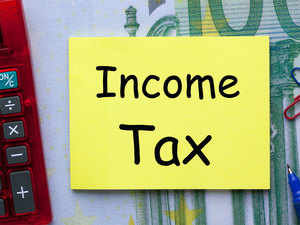 Getty Images
Getty Images- No tax liability if your taxable income does not exceed Rs 5 lakh
This is because an individual will be able to able to claim the tax relief under section 87A which has been hiked to Rs 12,500 from Rs 2,500 earlier.
(Net taxable income refers to total income less of deductions under section 80C to 80U of the Income Tax Act.)
You must remember that to avail this benefit, you will still have to file income tax return (ITR). As per income tax laws, it is mandatory to file ITR if the income in a financial year exceeds the basic exemption limit.
However, if your net taxable income exceeds Rs 5 lakh, then you will be liable to pay tax at the income tax rates applicable to your income.
There have been no changes in the income tax rates and slabs for financial year 2019-20.
Also read: Latest Income tax rates and slabs
- Withdrawal from NPS becomes tax-free
According to NPS rules, a subscriber can withdraw up to 60 per cent from NPS as lump-sum, rest 40 per cent has to be utilised for buying annuity.
- PAN- Aadhaar interchangeability
The amendments allow individuals to quote their Aadhaar number in forms such as Form 15G/Form-15H and so on.
Also Read: 6 instances where Aadhaar number can be quoted instead of PAN
- TDS threshold hiked to Rs 40,000
Due to hike in the TDS threshold limit, lower bracket taxpayers will not be required to submit Form 15G if the total interest income does not exceed Rs 40,000.
Here, one must remember that there is no change in the taxability of the interest income. Fixed deposit interest is fully taxable in the individual's (below age of 60 years) hand at the income tax rates applicable. Similarly, tax-benefit of Rs 10,000 is available in case of interest on savings bank account.
For senior citizens, tax-benefit of Rs 50,000 is available for interest income on savings account, fixed deposits and so on. Tax on interest income for senior citizens will be deducted only if the total interest in a financial year exceeds Rs 50,000.
Also Read: Tax benefit of Rs 50,000 from senior citizens
- Investing capital gains from one house into two houses
Individual can claim this benefit only if the capital gains accrued from selling the house does not exceed Rs 2 crore. Further, this benefit can be availed only once in a lifetime. Earlier, individuals could save tax on LTCG arising from sale of house by investing in one new house property.
- Hike in standard deduction to Rs 50,000
The standard deduction can also be claimed by pensioners whose pension is taxable under the head the salary.
- TDS on withdrawal of cash
- Additional tax-benefit on buying affordable house
A) The loan must be taken between April 1, 2019 and March 31, 2020;
B) The value of house property must not exceed Rs 45 lakh and
C) Individual should not own any house on the date of sanctioning of loan.
The additional tax benefit was over and above the tax benefit of Rs 2 lakh available on the interest paid under section 24. Due to this an individual can avail total tax break of up to Rs 3.5 lakh in FY 2019-20.
- ITR filing mandatory for certain cases
a) Expenditure incurred on foreign travel exceeds Rs 2 lakh in a financial year
b) If the individual incurs an electricity bill of Rs 1 lakh or more in a year
c) Claiming capital gains tax exemption on investment in house etc.
d) Amount deposited in current account held with bank or co-operative bank exceeds Rs 1 crore in a financial year
Earlier, filing ITR was mandatory if the individual's total income exceeded the basic exemption level.
- No income tax on vacant second house property
The move will come as relief to home owners as previously only one self-occupied property was exempt from tax. In such a scenario, taxpayers having more than one house property were required to pay tax on the notional rent if the property was lying vacant.
- Higher surcharge for super rich
Chartered Accountant Naveen Wadhwa, DGM, Taxmann.com says, "The surcharge of 25% or 37% (as applicable on your income) will be applicable only on your income from sources other than capital gains (long-term and short-term). If the income is earned from capital gains from the stock market (as referred to in Section 111A and 112A), then a surcharge of 10% or 15% as levied prior to Budget 2019 will be applicable. For other incomes such as salary, rental income, interest income and so on, new surcharge rate (25% or 37%) will be applicable to your income brackets."
- Parking and other charges come under TDS ambit
Earlier, only payments made towards property were under the TDS ambit and payment made on other services were not included.
- TDS on payments made to contractors
The deduction of tax will be done at the time of credit of such sum or at the time of payment of such sum whichever is earlier.
Also Read: TDS deduction on payments made to contractors
(Your legal guide on estate planning, inheritance, will and more.)
Download The Economic Times News App to get Daily Market Updates & Live Business News.
Read More News on
(Your legal guide on estate planning, inheritance, will and more.)
Download The Economic Times News App to get Daily Market Updates & Live Business News.









 Get Unlimited Access to The Economic Times
Get Unlimited Access to The Economic Times
